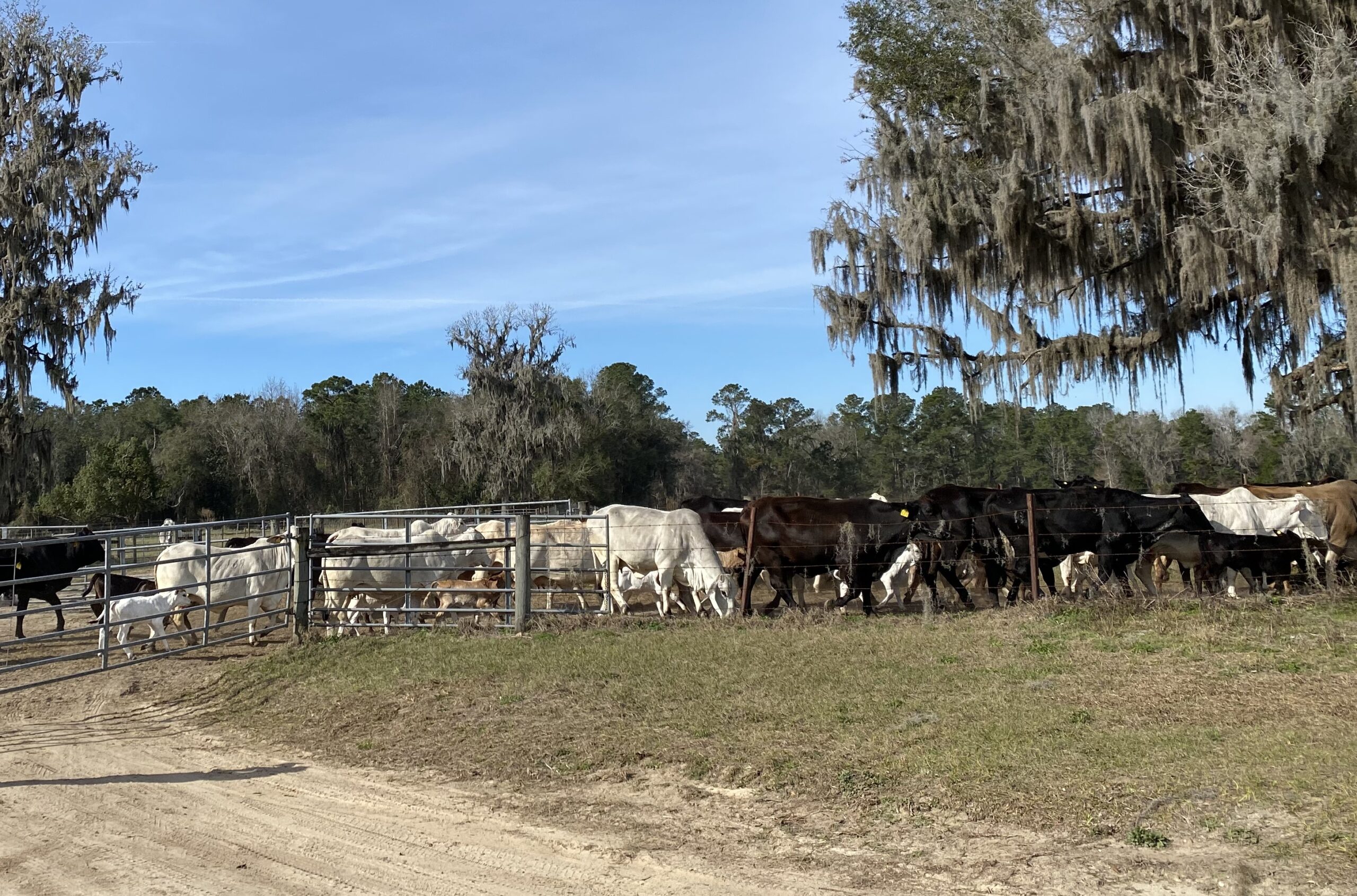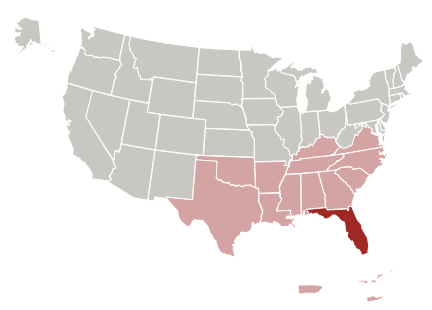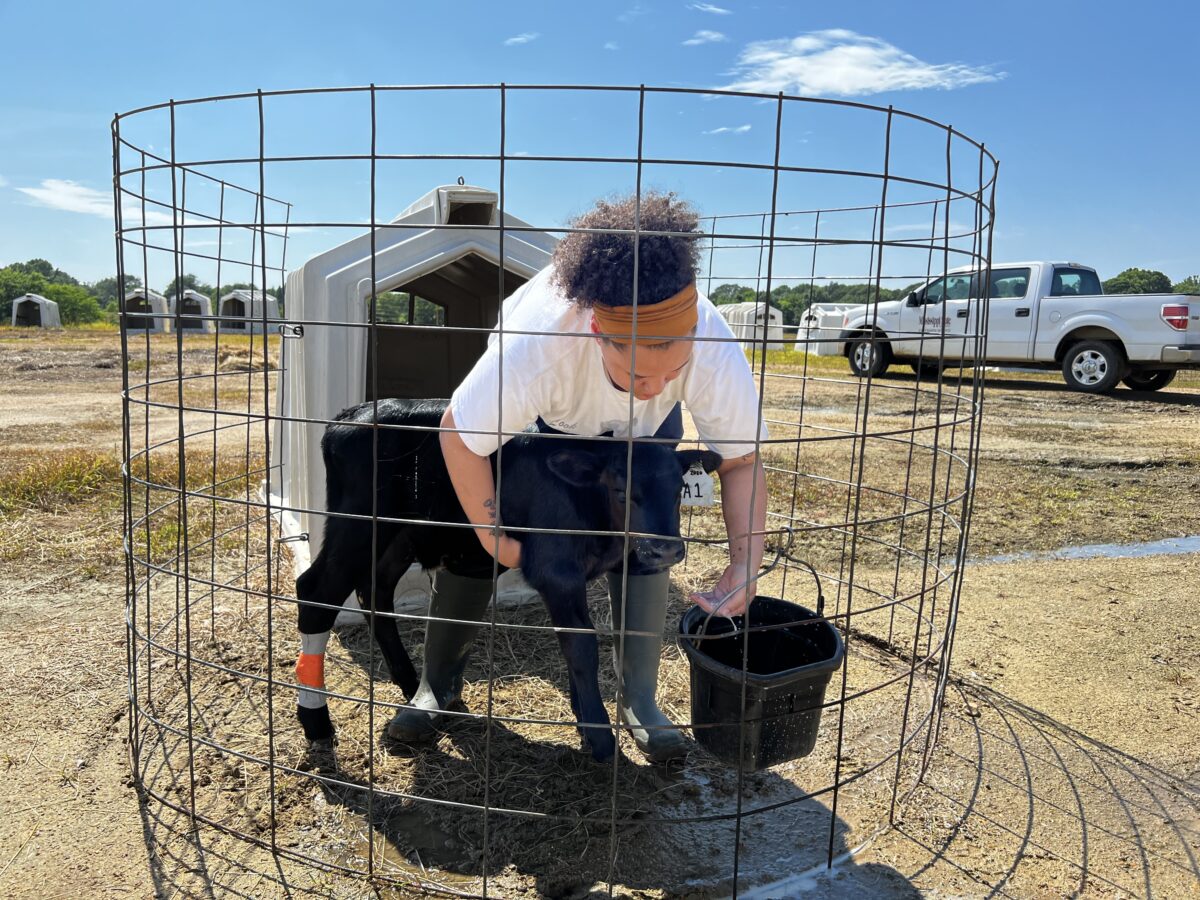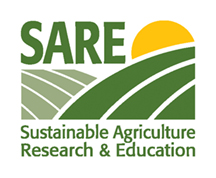
The multi-breed Angus-Brahman beef cattle herd with a graduated spectrum of breed compositions that ranged from 100% Angus to 100% Brahman. This unique population has been bred for more than 30 years by Dr. Mauricio A. Elzo at the University of Florida. Credit: Peixin Fan and Kwangcheol Jeong from University of Florida
A new microbiome guided strategy to improve livestock health, productivity, and profit margins for beef and dairy producers.
Our intention with what we're calling a microbiome guided strategy is to use our research findings to enhance calves’ microbiomes by suggesting to farmers how they can breed and manipulate the animal diet to boost their economic outcomes.”
—Dr. Peixin Fan, Graduate Student Grantee
Microbiome Research Can Contribute to Improved Economic Outcomes for Farmers

Region: Southern
State: Florida
Grant Type: Graduate Student
Grant: GS19-206
SARE POST-PROJECT EVALUATION IMPACT MODEL
This evaluation impact model is specific to this SARE-funded project.
Sustainability Impacts
The project grantees and stakeholders contributed to the following sustainability impacts:
- Production efficiency impacts
Grantee Indicators
(Graduate Student)
Project grantees (defined above) achieved sustainability impacts by engaging with the following indicators through involvement with project activities:
- Increased knowledge/skills
- Increased capacity/motivation
- Increased engagement
- Career growth
Stakeholder Indicators
(Undergraduate Intern)
Project stakeholders (defined above) achieved sustainability impacts by engaging with the following indicators through involvement with project activities:
- Increased knowledge/skills
- Increased capacity/motivation
- Career growth
The Success Story
Diarrhea remains a notable cause of death among beef and dairy calves at a high cost to farmers and ranchers. A deeper understanding of calves’ microbiomes holds the key to effectively reducing and preventing calf losses. Dr. Peixin Fan, a former PhD student in Dr. Kwangcheol Jeong’s lab at the University of Florida, utilized a SARE graduate student grant to conduct a study of fecal samples of a multibreed Angus-Brahman herd, filling a critical knowledge gap on the intricate microbial makeup linked to calf health. Her success was tied in part to her collaboration with Dr. Mauricio Elzo, a well-known genetic scientist at the University of Florida. Dr Elzo has been breeding Angus-Brahman cows for more than 30 years to bring together the genetic benefits of fast-growing Angus cattle and heat-tolerant Brahman cattle (an important consideration in tropical environments like Florida). Dr. Fan’s study confirmed earlier findings that beef cattle with a higher Brahman genetic composition are more resistant to parasite diseases, contributing to improved immunity to diarrhea. Notably, Dr. Fan’s research isolated beneficial strains including Lactobacillus strains, a probiotic (i.e. beneficial bacteria), associated with combatting diarrhea pathogens, as well as a novel species Streptococcus vicugnae sp. Overall, this SARE project highlighted how strategic interbreeding of cattle contributes to a gradual, positive change in gut microbiota. Further, this study made strides in offering practical solutions to dairy and beef cattle producers. By shifting their management practices to include strategic interbreeding and diet supplementation with specific probiotics, producers can improve livestock health, reduce cases of diarrhea, and up their productivity and profitability in the long-term.
I did my postdoc at Icahn School of Medicine at Mount Sinai in New York City because they have a lab focused on long-read sequencing and machine learning and I wanted to learn about these advanced technologies. Animal science moves relatively slower than human medicine in the microbiome analysis area. I am bringing the technology and the skills I learned in med school to the animal science world to advance them. Since becoming an assistant professor at Mississippi State University, Department of Animal and Dairy Sciences, I have also trained my students in long-read sequencing and machine learning. Utilizing our anaerobic chamber at MSU, we can now combine both culture-dependent and culture- independent methods to learn even more about the animal microbiome and how bacteria interact with animals to change their phenotypes.”
—Dr. Peixin Fan, Graduate Student Grantee

Grantee (Graduate Student) Highlights
During the grant term, Dr. Fan acquired valuable research skills including both wet and dry lab techniques in Dr. Kwangcheol Jeong’s lab. Using culture-dependent methods, she learned how to isolate bacteria and study their function and advanced her coding skills to process high-throughput genetic sequencing data sets using a supercomputer (bioinformatics). Dr. Fan’s work resulted in the isolation of four species of Lactobacillus strains, which demonstrated strong antimicrobial activity against pathogens found in calves with diarrhea, one of which had never been identified before. Dr. Fan shared her findings across multiple platforms, with publications in high-profile journals such as Frontiers in Microbiology and the ISME Journal of Microbial Ecology with a notable number of citations in the last two years. Her work garnered international attention as she was invited to speak about microbiome guided strategy to improve animal nutrition at the American Dairy Science Association symposium in Canada and share her findings at the International Food Protection Conference. The SARE graduate student grant provided Dr. Fan with essential steppingstones in the advancement of her career. She developed her teaching philosophy as she learned the most effective ways to explain and demonstrate complex research techniques to her undergraduate intern. The SARE project formed the basis of Dr. Fan’s PhD dissertation, which in turn opened the door for her postdoc work at the prestigious Icahn School of Medicine in New York City. She has since transferred the skills and techniques she learned about the human microbiome in medical school over to the animal science domain, incorporating the pertinent technologies in her ongoing research. In her current role as an Assistant Professor at Mississippi State University (MSU), she is further honing her expertise in the animal microbiome and training the next generation of researchers. With her oversight, one of her students is currently working on long- read sequencing in healthy and diarrheic dairy calves, taking the microbiome guided strategy to the next level. Using the specialized equipment available to her at the MSU lab, Dr. Fan is pushing the boundaries of what we know about the ruminant microbiome. In her MSU role, she is looking forward to engaging with producers and applying her research to address the critical challenges producers face in the livestock industry.
SARE Graduate Student Grants Are Valuable For Pursuing a Career in Academia
I really encourage my grad students to pursue SARE graduate grant funding because it’s a really good opportunity, not just to secure funding, but because it is also a good practice, especially if they want to continue in academia as professors.”
—Dr. Peixin Fan, Graduate Student Grantee
Other Stakeholder (Undergraduate Intern) Highlights
Grace Liu, an undergraduate student from Berkeley, participated as an intern on Dr. Fan’s research team, gaining valuable skills and research expertise. Her involvement included collecting samples on farms, conducting laboratory work such as extracting DNA. Beyond these hands-on contributions, Liu also shadowed and assisted in computational work. In recognition of her contributions, Liu’s name was credited as a co-author in Dr. Fan’s published journal article detailing the outcomes of their SARE research. Liu’s experience on this project led her to focus on a career in veterinary medicine at UC Davis.
Sustainability Impacts
This SARE grant focused on combatting diarrhea as a prevalent cause of death for cows, and especially young calves. By discovering solutions that lead to healthier, more productive beef and dairy cows, the microbiome guided strategy contributes to the long-term economic viability of livestock operations. Isolating the beneficial bacteria that helps cows remain healthy and thrive means that probiotics can be created that supplement cow diets, giving calves vulnerable to disease more resilience to pathogens as they grow. A combination of diet and strategic breeding practices aids producers in improving animal well-being, increase cow life expectancy and raise production efficiency.
It was accidental because we were isolating bacteria and doing the whole genome sequencing. After we uploaded the data to the National Center for Biotechnology Information (NCBI) database, an FDA scientist contacted us to say they had found the sequencing information and that we had actually discovered a new bacteria!”
—Dr. Peixin Fan, Graduate Student Grantee
SARE Grantee Discovers New Bacteria Doing Funded Research
Contributors
Dr. Fan gratefully acknowledges that her work would not have been possible without the training from her PhD advisor, Dr. Kwang Cheol Jeong, Professor of Microbiology and Food Safety, who provided pivotal assistance and support in proposal writing, project budgeting and securing research funding for her PhD. Additionally, she received support from Dr. Mauricio Elzo who leads a long-term cattle breeding program and is a Professor of Animal Breeding and Genetics at University of Florida. She also received training in bacterial isolation from Dr. Miju Kim, Professor of Food Science and Biotechnology at Kyung Hee University.

